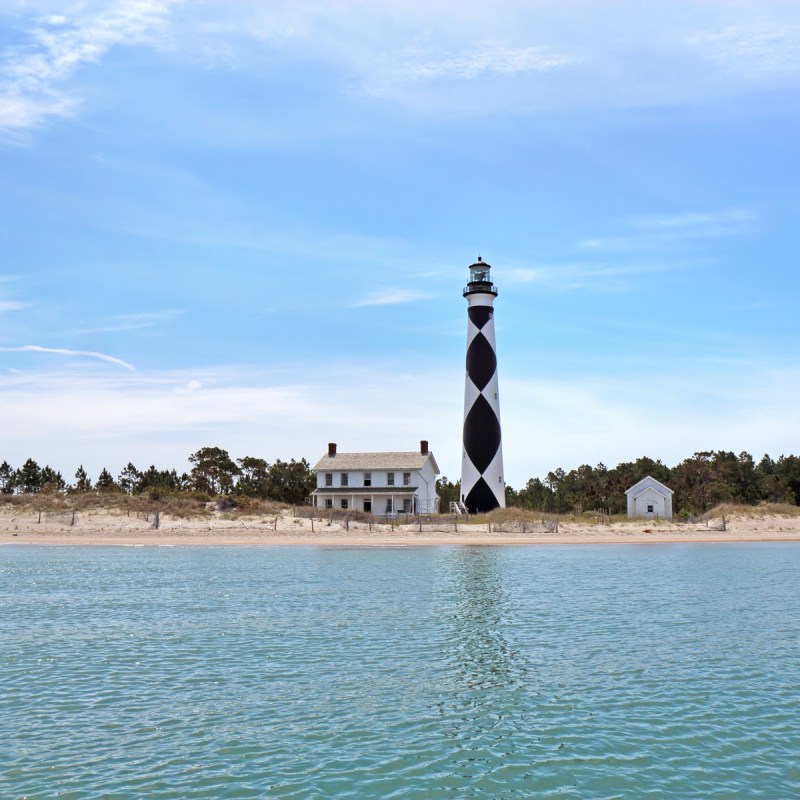
Cape Lookout National Seashore, off the coast of North Carolina, has been known as a fantastic place for stargazing over the years. Now, it’s finally getting the official recognition it deserves.
Videos by TravelAwaits
Earlier this month, the National Park Service (NPS) and the International Dark-Sky Association (IDA) announced that Cape Lookout National Seashore is now certified as an International Dark Sky Park. The certification “recognizes the exceptional quality of the night skies of the park and the opportunities it provides for astronomy-based experiences for park visitors,” the group explains.
Interestingly, Cape Lookout National Seashore is the first Atlantic coastal International Dark Sky Place in the NPS to receive the certification.
“This certification is both an honor for our community and a recognition of the unique values that make this park a national treasure,” Jeff West, superintendent of Cape Lookout National Seashore, said. “Embarking on this project helped me remember the wonder and amazement I felt going into the night sky as a child. The possibilities I imagined then are still there, dwarfing life’s daily demands when put into perspective. Maybe we all need a little star gazing right now.”
Ashley Wilson, director of conservation with the IDA, said the staff at Cape Lookout National Seashore “understands and is fully committed to dark-sky efforts, but they also visibly demonstrate the balance between using light efficiently and coexisting with the natural, nocturnal environment with their lighting decisions.”
The Need For Dark Skies
The IDA works “to preserve and protect the nighttime environment and our heritage of dark skies through environmentally responsible outdoor lighting,” it explains.
“The International Dark Sky Places Program was founded in 2001 as a non-regulatory and voluntary program to encourage communities, parks, and protected areas around the world to preserve and protect dark sites through effective lighting policies, environmentally responsible outdoor lighting, and public education,” the IDA explains. “When used indiscriminately, artificial light can disrupt ecosystems, impact human health, waste money and energy, contribute to climate change, and block our view and connection to the universe.”
A designated International Dark Sky Park has “an exceptional or distinguished quality of starry nights and a nocturnal environment that is specifically protected for its scientific, natural, educational, cultural heritage, and/or public enjoyment.”
Not An Easy Feat To Accomplish
The Cape Lookout National Seashore — which has a Harkers Island, North Carolina, address — was established in 1966. The National Seashore stretches for 56 miles and includes a collection of completely undeveloped barrier islands. As you would expect, there’s even a Cape Lookout Light Station.
Cape Lookout and its partner, the Crystal Coast Stargazers, regularly host an Astronomy Night at the Harkers Island Visitor Center to teach visitors about constellations, spot planets in the night sky, watch for the International Space Station to pass overhead, and even use a telescope to see objects deep in space, such as other galaxies. They also give presentations to educate people about the effect of light pollution as well as ways to minimize those effects.
Despite those efforts, the process to be certified as an International Dark Sky Park was rigorous. It took 2 years and required the support of Crystal Coast Stargazers, Core Sound Waterfowl Museum and Heritage Center, and the Carteret County Chamber of Commerce.
First, the process required evaluating light fixtures within the park and surrounding area. Then, in some cases, it required light fixtures to be retrofitted, or replaced altogether, so they would meet dark-sky-friendly lighting requirements. The final step was to create a plan to maintain outdoor lighting into the future, which will protect the park’s dark skies for generations to come.
“Partnering with Cape Lookout National Seashore in its application process has been a way to give back to the park which has provided so many enjoyable hours of stargazing for our club members,” David Heflin, club coordinator for the Crystal Coast Stargazers, said. “Now, everyone will be aware of the nighttime treasure we have here on the North Carolina coast!”
Know Before You Go
Cape Lookout National Seashore obviously is an ideal place for stargazing, but visitors can also watch wild horses and go shelling, fishing, birding, and camping. They can also see the Cape Lookout Lighthouse, although it currently is closed while structural repairs are being made. What’s more, the park is even open 24 hours per day and 365 days a year — weather permitting.
You can learn more about planning a visit to Cape Lookout here.
If you enjoy looking at the night sky, be sure to read all of our stargazing coverage, including:
